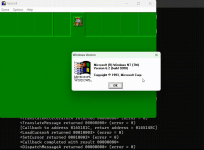CaptainWillStarblazer
New Member
- Joined
- Feb 18, 2024
- Messages
- 6
I don't know if this belongs more in the Vintage Computer Software section, but for the first time, it has become possible to run (a select few, buggy) Windows NT for Alpha programs on x86. As you may know, there was a way to run x86 Win32 programs on Alpha via FX!32, but the opposite was never possible (nor is there presently a DEC Alpha system emulator capable of booting Windows NT), until now, via my project, EmuWoW. EmuWoW supports both the MIPS and Alpha architectures, and is capable of running a few simple apps for both.
EmuWoW can be found here: https://github.com/BHTY/EmuWoW and was even featured on VirtuallyFun, the blog post from which has surfaced on HN and some other tech news aggregators. I don't know if this is the right place to promote such a project but I was hoping I'd be able to gauge interest among DEC enthusiasts.

EmuWoW can be found here: https://github.com/BHTY/EmuWoW and was even featured on VirtuallyFun, the blog post from which has surfaced on HN and some other tech news aggregators. I don't know if this is the right place to promote such a project but I was hoping I'd be able to gauge interest among DEC enthusiasts.

